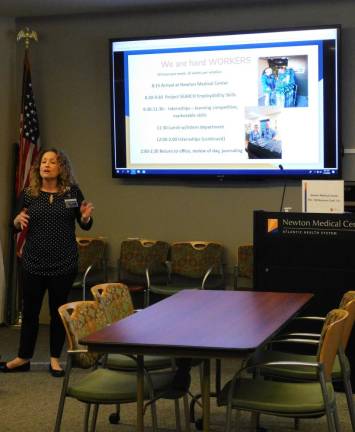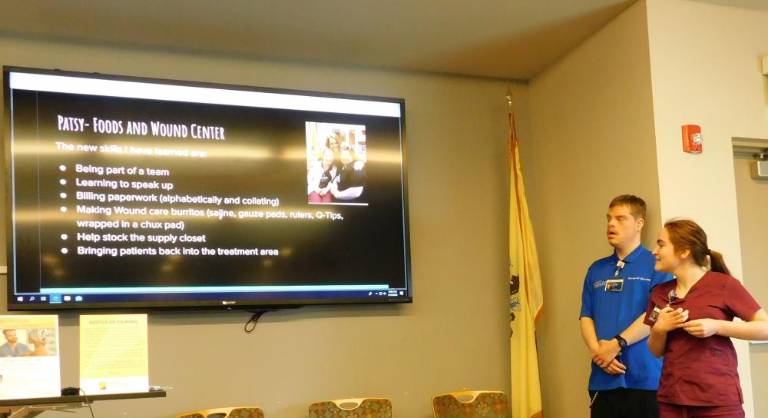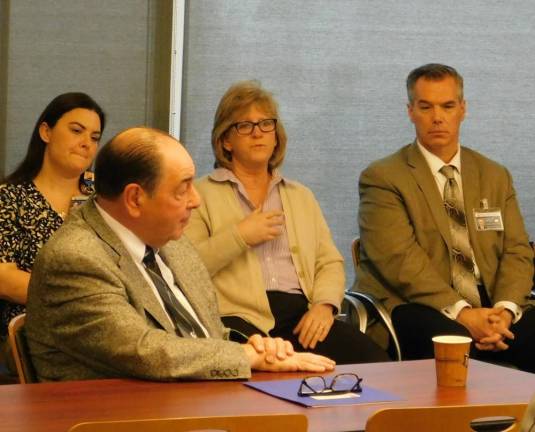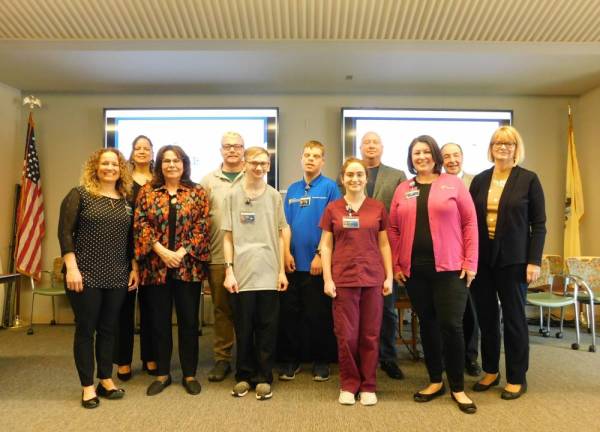Project SEARCH celebrates success, addresses funding concerns
Public Health. The skills-based internship program for disabled young adults is halfway through completion, and its supervisor says it's success surpasses all expectations. For information, or to apply for the Project SEARCH’s 2020-21 internship program, visit www.sussexecs.org.




Project SEARCH, an immersive, skills-based internship program for young adults with disabilities, is halfway through its first year at Newton Medical Center, and supervisor Jaime Westfield says the program has already been successful even beyond what she could have hoped. The Newton program serves Sussex, Morris, and Warren Counties, and is part of a larger national and international Project SEARCH network, founded in Cincinnati in 1996, and has served over 25,000 participants.
“This program is valuable and unique,” Westerfield said at on Open House to showcase the interns’ midyear progress on Tuesday, March 10, “There’s an educational component to the internship, of course, but they are also in the hospital all day, every day, working.”
Westerfield outlined the interns’ daily routine, beginning at 8:30 a.m. each weekday with work on what she calls ‘soft skills’, things like business etiquette, safety training, financial literacy, and resume-building. The interns are also learning to improve their email skills through a pen-pal relationship with Project SEARCH interns at another location.
“They work from 9:30 to 2, with a break for lunch,” she said, “And we end the day with a review and writing in our journals.”
By the end of the year, the interns will have completed 200 hours apiece at each of three 10-week rotations, working in all aspects of hospital life from materials delivery and patient transport through food services, cardiac health, and wound care. Westerfield said one of the biggest things they are learning is independence and the personal accountability of reaching out when they have a concern or will not be coming to work.
“Even with the SLE programs we see in the schools, it’s still their parents’ or their job coach’s responsibility to handle their absences,” she said, “Here, they know they have to do it for themselves.”
The program is open to all seniors and super-seniors in the three counties who qualify for SLE, or structured learning experience, and meet the eligibility requirements set forth by the Department of Vocational Rehabilitation. Westerfield said the program is receiving a lot of recognition for its effectiveness, but they need more interns and better funding to be able to continue. Westerfield herself has even been chosen to be on a small committee who will be charged with writing new national curriculum for Project SEARCH.
“The best part is, though,” she said, “We’ve already been asked to begin a program at the Hackettstown hospital, too, but we need a higher enrollment for that.”
Renee Caratozzolo attended the open house; she’s a counselor with the DVR.
“If you look at the statistics on employment in young people with disabilities,” Caratozzolo said. "We see that the schools can be the biggest barrier because of funding. SLE can be very limited in time and scope. Project SEARCH is multiplying the skills they can learn, which makes it much easier for DVR to place them in real-life working situations when they finish their internships.”
Funding is a large component of all programs serving young adults with developmental disabilities, and Sussex County Educational Services Commission Superintendent Andrea Romano explained how the numbers break down for the interns to participate in Project SEARCH.
“The schools all have to provide services, and if they can do that in district, it’s an annual cost of 12-14,000 per student,” Romano said, “If they need to send the students out of district, it’s closer to $60,000 a year, not including the cost of transportation. Project SEARCH costs between $35-37,000, which would actually be a savings to districts who are currently sending their students out for services.”
For young adults who have already graduated, the cost of the internship comes from their Department of Developmental Disabilities (DDD) funding, which according to Westerfield and Caratozzolo, muddies the funding waters quite a bit.
SCESC Board President Gil Muscatello said that money is a crunch, but the program is invaluable to the community and the young adults it serves.
“The school money can cover a requirement, but filling a requirement is not filling a life," Muscatello said. "We need to find a way to lower costs so we can open the doors of this program to more kids. We’re not only making an investment in them but in our society.”
Noreen Cody’s son Kevin is one of the program’s inaugural interns, and she drives two hours roundtrip twice a day to bring him to and from the hospital. The travel is well worth it, she said, for the value it’s given to her son and their whole family.
“A year ago, I didn’t think I’d be able to send Kevin into the world with a full-time job,” Cody said, “But this program is the best thing out there. Kevin is more confident, independent, and social, and the impact on our lives has been immeasurable. We’ll be looking to get him a job at a hospital closer to home, and I’m not uncomfortable with sending him to work now. This program should be everywhere.”
Kevin is currently working in the Heart Center, and supervisor Nina McGrath said he lights up everyone’s day with his positive attitude and comforting nature.
“I’ve been here for twenty years,” McGrath said. “And I can’t stress enough the importance of this program. For us, as mentors, this goes beyond teaching skills, this is an absolute experience. It feels like it fills in something that was missing in this hospital; it’s dynamic and amazing, and I can’t wait to see where this program goes.”
The interns all took a turn describing what their work entails and what they are learning about themselves in the course of learning their assigned tasks. Intern Patrick said he loves working in patient transport, but he wants to eventually work in administration. Patsy is enjoying her work in wound care and is proud of her progress in being her own advocate. Kaci would like to continue her education and become a CNA when her internship is complete. Nick, a slight young man with a huge smile, said that he loved his rotation through food services and hopes to be hired on in a permanent role at the end of the year.
Sussex County Board of Chosen Freeholders director Sylvia Petillo and member Josh Hertzberg attended the open house, and Hertzberg said it was an eye-opening presentation for him.
“I’ve seen the exposure to SLE at the local level in Sparta,” he said, “I’d like to see the community step up to support this program more, though. We need to find funding for this, to teach our young people real-life skills that they can use to be successful on their own. The jobs they are doing here are not the usual jobs we see available for this population- we need to fund this and serve them better.”
Westerfield is concerned about funding, too, which won’t come without higher enrollment. She wants the community to know that applications are now available for next year’s class of interns. She said they’re focusing on recruiting more high school students for the program’s second run, due to the discrepancy in funding from the schools and DDD, where the budgeting barely covers the program’s basic elements.
“For those families still in school that are used to SLE, I want them to know we have this to offer their kids,” she said. “This first year here has exceeded anything we ever imagined.”
To receive more information or an application for Project SEARCH’s 2020-21 internship program, interested parties can email Westerfield at jwesterfield@sussexesc.org, or visit www.sussexecs.org and click on the Project SEARCH tab on the homepage menu